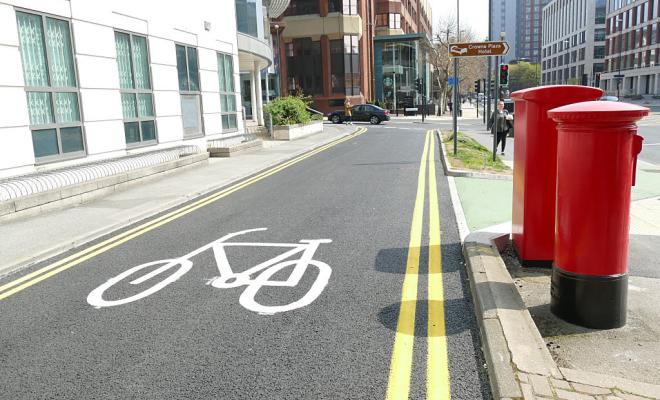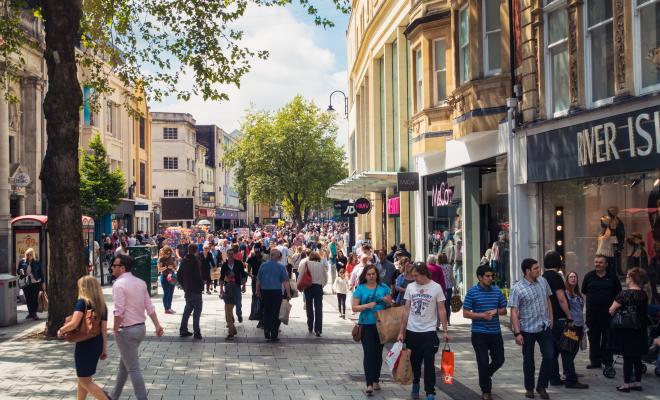25 Sep 2024
Councils, climate and waste
The government says that waste management is responsible for just 4% of UK greenhouse gas emissions, with the breakdown of waste at landfill sites being the main cause. But this statistic only tells a partial story of the impact that our throw-away society has on the climate and nature.
The extraction and processing of natural resources to manufacture consumer products produces a large amount of greenhouse gases overseas. Almost a quarter of the average person’s energy consumption and associated emissions is a result of the products we buy. Buying less, as well as re-using, repairing and then recycling what we do buy, reduces waste and its impacts.
Your local council has an important role to play in reducing waste and promoting sustainable consumption. Ideally, councils should produce circular economy strategies for their areas. A circular economy is where resources are used for as long as possible, have the maximum value extracted from them, and are recovered and regenerated at the end of their life. Councils should make it easier for their residents to reduce waste and unnecessary consumption by promoting community sharing and re-use.
The Climate Change Committee has recommended that waste (excluding food) should be reduced by more than a third by 2030, that edible food waste should be halved, and that 68% of remaining waste should be re-used or recycled. The UK government has now set a recycling target of 65% by 2035. In Wales the ambition is higher, with a target of 70% by 2024/25.
Friends of the Earth says higher recycling targets are needed. The ambitious target we recommend is zero waste, ie after preventing waste as far as possible the aim should be 100% re-use or recycling of remaining waste. Councils should be aiming to send no waste to landfill or incineration by 2030. We recognise that this is very ambitious given that the recycling rates for waste collected by local authorities is currently around 42% in England and just over 65% in Wales. That's why we're also calling on national governments to put measures in place to help (see the "Funding and powers" section below for our recommendations to the UK government).
When it comes to food waste, councils should follow the food waste hierarchy of prevent, re-use, recycle. They should also ensure that any remaining biodegradable waste that can’t be recycled is used to generate biogas. As a result of the Environment Act 2021, councils that aren't already doing so will be required to collect food waste separately, with compliance dates dependent on existing contracts.
They can also make a difference by reducing the waste generated in their own offices and buildings. For example, banning the use of single-use plastic in council offices and premises is a great start.
The target
Councils need to show ambition on a par with the climate and ecological crises. With existing resources and powers, a reasonable target for councils to aim for is:
To be a sustainable consumption and zero-waste area, where all waste is minimised, recycled or re-used as part of a circular economy approach.
Challenges
Councils require more funding and powers from national government, and we recognise that under-resourced councils may find it hard to reach our ambitious target. This is especially the case in areas that have logistical challenges such as high numbers of flats and estates where it’s harder to organise multiple collections, including separate food waste collections.
Reducing contamination in recycling is also a challenge, but sharing good practice will help to overcome these barriers. For example, ReLondon is working with the London Borough of Lambeth to trial solutions and share these with other councils.
In addition, more responsibility must be placed on product manufacturers to make sure all goods are 100% recyclable and to cover the costs of dealing with products at the end of their life (see more in the “Funding and powers” section below).
Councils leading the way
Some councils are already making strides to reduce waste and encourage sustainable consumption. Share these examples with your council using this template email and help inspire them to take action.
Derry City and Strabane District Council is one of the first local authorities in the UK to create a zero-waste circular economy strategy. It prioritises the prevention of waste and aims to influence the design of products to extend their lifecycles. And when it comes to encouraging re-use, the council is shifting local attitudes and behaviour to redefine waste as a vital resource. It’s also estimated that circular economy principles can create savings of £3.1 million per year.
Durham County Council is cutting its consumption of single-use plastic, and helping partners and suppliers do the same. It’s created a single-use plastic pledge, which it follows and encourages others to sign up to.
Pembrokeshire County Council’s share, repair and re-use network cuts waste and develops employment skills for local people. It includes repair cafés and a Library of Things.
Bristol City Council is prioritising action on preventing food waste, as well as ensuring more food waste is collected for biogas generation. Its "Slim My Waste, Feed My Face" campaign encouraged residents to use their brown food bins instead of black bins for food waste, and successfully cut the amount of food waste going to landfill.
Three Rivers District Council recycles an impressive 64.1% of its waste, which was the highest rate in England in 2019/20. The council attributes its success to offering a wide range of recycling services, good communication with residents, and co-operation with neighbouring councils.
Learn from others
Local action groups across the country have been working with their councils to reduce waste where they live. For example, Llangollen Friends of the Earth successfully got the town awarded “plastic-free” status through a combination of campaigning and practical projects. The group spent time in the community speaking to businesses and schools about ways to cut down plastic usage. It also held workshops for local residents such as an ecobrick workshop, explaining how unrecyclable plastic waste can be turned into building materials. The group used social media to raise awareness and engage a wider audience by creating infographics to share online, which directed residents towards waste-reducing businesses. Through its hard work, the group got 10 local businesses to sign up as “plastic-free pioneers” and reduce the amount of packaging they use.
Some local action groups have been opposing incinerators where they live. Burning waste in an incinerator contributes to climate change, even when they’re being used to produce electricity. In fact, incinerators emit more carbon dioxide (CO₂) per megawatt hour than gas-fired power plants.
Stop Incineration North East, along with other groups in the area, has been running a local campaign against the proposed Tees Valley Incinerator. If the incinerator is built, it’ll cost over £300 million and each year it’ll burn over 450,000 tonnes of materials deemed to be waste. This would lead to more traffic making deliveries to the incinerator, more pollution, more noise, more CO₂, and decreased recycling rates in the area. As part of the campaign, groups joined the local carnival parade with a float made of black bins and smoke to highlight the damaging impact the incinerator would have.
Wyre Forest Friends of the Earth was also involved in a campaign against a proposed incinerator in Kidderminster, which would have burnt 75,000 tonnes of commercial and industrial waste every year. Using a simple online action, it encouraged local people to write to their county councillors and ask them to oppose the incinerator. Want to set up a similar action? Take a look at our guide to using Action Network, a digital campaigning platform.
Convince your council
The best way to convince your council to take action on waste is to show that it’s what lots of people in the community want. The more people involved in your campaign, the more likely your council is to listen. You should make your campaign diverse, stronger and more impactful by building alliances with others.
In Yorkshire, councils have worked as part of the York and North Yorkshire Local Enterprise Partnership (LEP) to develop a Circular Economy Strategy. Two large workshops attended by over 80 stakeholders were held during the strategy’s creation. Now the LEP is supporting the creation of Circular Towns such as Malton, with strong community involvement in initiatives such as repair hubs and food share schemes, as well as in supporting local businesses to understand the benefits of the circular economy approach. Similarly, Bristol City Council’s success in cutting food waste (see above) was helped by the presence of an active community network of food sharing and redistribution schemes.
Councils are also more amenable to introducing schemes that have a wide array of benefits, as it generally means they’re more cost effective, so be sure to tell your council about them. They include:
Skills for local people. Pembrokeshire’s share, repair and re-use network (see above) has provided paid work, training and work experience for people with physical, sensory or learning disabilities, mental health issues, and work-limiting health conditions. Similarly, Derry City and Strabane District Council (see above) provides residents with a range of skills training, from furniture repair to upcycling clothes.
Social benefits. Derry City and Strabane District Council provided reconditioned laptops to school children who wouldn’t otherwise have access to one during pandemic school closures, cutting waste and helping local families at the same time. Supporting community food redistribution schemes also cuts waste while helping families with lower incomes.
Council savings. Derry City and Strabane District Council estimated that circular economy principles could create savings of £3.1 million per year. Surrey County Council estimates that it could save almost £2 million a year by diverting all textiles from incineration to recycling. It provides a collection service for textiles and has increased the amount being collected for recycling from 13% in 2016 to 22% in 2021, but it’s finding it challenging to increase this further. Community engagement to encourage recycling is key to councils increasing recycling rates, but they often have limited resources, so this is something that local action groups and other stakeholders could help councils with.
Funding and powers
Action by central government will empower councils to do more to tackle the climate crisis. Councils can and are acting now, but it’s hard to find a council able to act across all the areas they need to and at the scale and pace commensurate to the climate and ecological emergencies. That’s why they need additional powers and resources.
Waste is a devolved issue. The following recommendations are focused on what the UK government can do to help councils in England reduce the amount of waste going to landfill.
- Reducing pressure on local authority systems by banning single-use plastics. Some items like straws and single-use plastic cutlery are, or are soon to be, restricted, mainly from takeaway outlets. But this is nowhere near what’s needed, for example getting rid of most supermarket packaging.
- Implementing Extended Producer Responsibility (EPR) legislation. By placing the financial responsibility for a product's end-of-life environmental impacts on producers, EPR policies can incentivise companies to produce less waste in the first place, reduce the recycling costs for councils and taxpayers, and drive better design and longer life products. To be effective, EPR should be fully funded by producers and ensure that local councils achieve full net cost recovery. Although the government says it’s committed to EPR, it’s delayed doing anything about it until at least 2024. Even then there’ll be gaps, for example cost recovery won’t include business waste.
- Funding the introduction of separate food waste collections for homes to ensure that food waste is collected in more places. Around 43% of local authorities currently have separate food waste collections, but many find this challenging to fund, particularly where collecting food waste is more complicated and costly, for example from flats. The government has committed to all homes having this service, but it needs to support and properly fund councils if it’s to meet this target.
- Enabling local authorities to restrict the frequency of residual waste collection, as appropriate to local circumstances, to achieve waste reduction.
- Allowing willing local authorities to trial the implementation of “pay as you throw” schemes, without penalising households with lower incomes.
Friends of the Earth has joined local government organisations, academics and other NGOs in setting out a Blueprint of what’s needed from national government to support councils in key policy areas, including waste and consumption. The coalition has assessed how the government is doing so far in its progress tracker. Be sure to ask your council to sign up to the Blueprint if it hasn’t done so already.
Helpful resources
Find out what progress your local area has already made on this topic with our data tool, “Near you”.
Watch our training video and learn what your council can do to be a sustainable consumption and zero-waste area:
Find out how you can build a strong campaign to push your council to take ambitious action in this area.
Read more examples of best practice by councils.
Find out how your council is doing by looking at its Council Climate Action Scorecard, created by Climate Emergency UK.
Any references to national policy in this guide relate to policy under the previous government and reflect the policy context at the time it was written.




